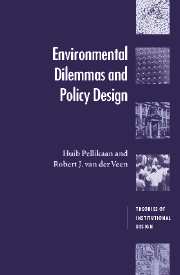Book contents
7 - The non-equivalence of the cases
Published online by Cambridge University Press: 22 September 2009
Summary
Hard and easy cases of the dilemma
Modern theories of institutions recognize that ‘the traditional behavioral assumptions have prevented economists from coming to grips with some very fundamental issues and that a modification of these assumptions is essential to progress further in the social sciences’. Douglass North argues in favour of important modifications of the behavioural assumptions. His starting point is the complex causal relationship between the subjective perception of individuals operating in an institutional environment. He is concerned with the existence of institutions over time, i.e., of the workings of formal and informal constraints on behaviour. These constraints define the opportunity set of individuals. They also partly shape the way people choose in the various social contexts that give meaning to the constraints.
The actor's perspective provides one important modification of the economic approach by accepting that different people can have different preferences and motives. In line with institutional approaches, it is then of interest to ask to what extent our three cases of the dilemma may have contextual qualities which facilitate or hinder environmentally friendly attitudes and behaviour. In previous chapters, it was repeatedly shown that the aggregate level of cooperation differs among the environmental cases. In this chapter we take a closer look at the characteristics of the individual response patterns across the three cases.
The question is whether the three Potential Contributor's Dilemmas somehow demand different intensities of cooperative attitude.
- Type
- Chapter
- Information
- Environmental Dilemmas and Policy Design , pp. 124 - 135Publisher: Cambridge University PressPrint publication year: 2002

